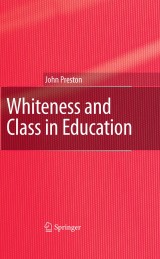Details

Whiteness and Class in Education
|
96,29 € |
|
| Verlag: | Springer |
| Format: | |
| Veröffentl.: | 08.08.2007 |
| ISBN/EAN: | 9781402061080 |
| Sprache: | englisch |
| Anzahl Seiten: | 214 |
Dieses eBook enthält ein Wasserzeichen.
Beschreibungen
Like many of my friends I didn’t really realise that I was working class until I went to university. Suddenly, what I thought as normal became subtly and not so subtly differentiated as I came into close contact with the middle classes. I had not known a time, though, when I hadn’t been white, but I didn’t really realise that I was white until I read David Roediger’s (1991) book ‘The Wages of Whiteness’. Through reading this work and others on the topic of whiteness the sense of my own whiteness became palpable to me. Namely, that what I naively thought to be a timeless property of my skin was a social construction that had acquired so much symbolic weight over time that it had become seemingly real: a racial formation and project. This was with consequences, in that a good part of my actual and psychological labour market and other employment benefits were not part of a meritocratic system, but due to the oppression of people of colour. This might be part of a system that I at the time associated only with the far-right, a system of white supremacy. Fundamentally, my skin was property and the gains that I had made through it were at the expense of others. I was a ‘so called white’ (Ignatiev and Garvey, 1996) who everyday made a political decision to not commit ‘treason’ to whiteness.
White Identities, Practices and Privileges in Education.- How the White Working Class Became ‘Chav’.- Class and Race Strategies in Adult Education.- Smells Like White Spirit.- Policy, Pedagogy and ‘White Supremacy’ in Education.- Take the Skinheads Bowling.- Homeland Insecurity.- Towards a ‘Trash Crit’.- Concluding Remarks.- From Troubling Whiteness to Treason to Whiteness.- From Troubling Whiteness to Treason to Whiteness.
<P>The critical study of whiteness has influenced anti-racist pedagogy and research. A volatile area of study, in terms of the re-centering of white discourses and the appropriation of the writings of black scholars, confronting whiteness has become a controversial but potentially radical way of approaching educational issues. In this pioneering volume critical whiteness studies is applied in the United Kingdom in a variety of educational contexts. Although whiteness is considered to be a system of oppression that benefits white students and teachers in educational arenas it is not necessarily monolithic. Whiteness is flexible and inflected by class to produce new ‘whiteness(es)’ that are no less racist in intent or practice.</P>
<P>Through the use of ethnographic, biographical and documentary research how whiteness ‘works’ in education is revealed. The ways in which working class whites are represented as ‘white trash’ or ‘chav’; the subtle actions of white middle class learners to reduce diversity in adult education and the pre-modern qualities of white ruling class schooling are used to highlight both divergence and congruence in the racial formation of whiteness. Policy issues are also considered, in particular the merits of regulating ‘hate speech’ in universities and the ways in which racist ‘civil defence pedagogies’ have become embedded in educational and homeland security policies. </P>
<P></P>
<P>However, this book does not just consider the practices of whiteness but also how practitioners might consider critical whiteness studies in anti-racist practice. It is concerned with not only identifying how ‘white supremacy’ continues to dominate educational discourse and practice but how it can be resisted.</P>
<P></P>
<P>Through the use of ethnographic, biographical and documentary research how whiteness ‘works’ in education is revealed. The ways in which working class whites are represented as ‘white trash’ or ‘chav’; the subtle actions of white middle class learners to reduce diversity in adult education and the pre-modern qualities of white ruling class schooling are used to highlight both divergence and congruence in the racial formation of whiteness. Policy issues are also considered, in particular the merits of regulating ‘hate speech’ in universities and the ways in which racist ‘civil defence pedagogies’ have become embedded in educational and homeland security policies. </P>
<P></P>
<P>However, this book does not just consider the practices of whiteness but also how practitioners might consider critical whiteness studies in anti-racist practice. It is concerned with not only identifying how ‘white supremacy’ continues to dominate educational discourse and practice but how it can be resisted.</P>
<P></P>
The first collected book which uses critical whiteness studies to examine education outside of the United States Uses a range of empirical techniques to interrogate whiteness within education in a number of settings (eg it moves beyond schooling) For those interested in ‘race’ issues in education, the book explores a new paradigm though which racism can be explored and confronted

















